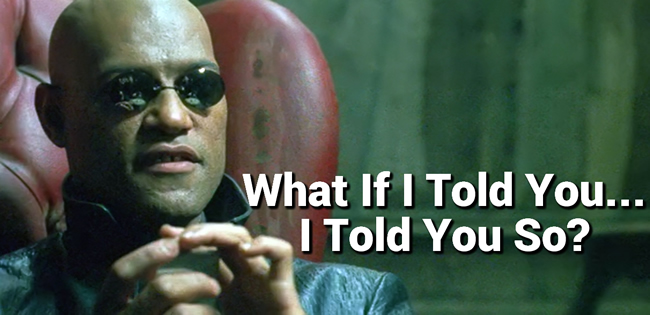
Don’t You Hate When People Say I Told You So? I know I do. So I won’t say it. I’ll let you just come to the conclusion for yourself. Even if it’s with a little bit of prompting.
Back in December (seems so very long ago doesn’t it?), while everyone was making predictions for 2014, I walked the virtual plank and offered, not predictions, but rather a few guarantees on the continued evolution of social media marketing. As the Super Bowl was being played in New York, I thought I’d channel the voice of Joe Namath and make a few bold guarantees.
One of those guarantees was in regard to the type of content that will resonate with social media users.
“As we move into 2014, I believe that our audiences will want exactly that from us. The Facts. Content isn’t King. Content is King, Queen, Pawn, Rook and Bishop. It IS the entire game. This makes the brand newsroom concept EXTREMELY viable and you will see many brands understand the importance of being media companies.
Brands and businesses that understand the brand newsrooming concept will foster substantial communal growth and interaction. Those that don’t…who cares? They’ll be wholly irrelevant in 2014.”
Some called it brash, bold or outright crazy. But I was kind of cheating when I made that statement. You see as a part of my daily activities, I actually spend a lot of time reviewing trends and studies and I dig deep into the data so that I can stay ahead of the curve. You see, as long as you can read and understand a trend line, it’s pretty easy to determine where things are headed.
One of those trend lines I’ve been following is the growing apathy that social media audiences have towards brands. If you’re a brand manager you should know this. If you don’t, I’d check my counsel. You should have known that the end is near for what has become social media marketing de rigueur.
This trend line has been further underscored by the results of a study by Havas which concluded that people really don’t care all that much about brands and that they wouldn’t blink an eye if most of them simply went away.
“Most people worldwide would not care if more than 73% of brands disappeared tomorrow. Think about all the money spent globally on marketing, communication and public relations. Then think that for more than 73% of the companies who are spending it, their brands wouldn’t be missed if they disappeared entirely.”
Now for the real bad news. That 73% figure is how people see brands worldwide. Consumers in the United States say they wouldn’t care if 92% of brands just closed their doors and ceased to exist! Ouch!
That’s what happens when you don’t have any real brand identity, no real purpose and rely on P&I (price and item) as a message. If you rely on P&I as a message then all you become is a P&I brand. You’re not providing anyone with any real reason to bond with you. There’s no value exchange whatsoever.
As Shane Snow, the chief creative officer at Contently recently wrote, “The choice should not be, Should we hide? but instead, “Does this help the user more than it helps us?”
Your content, if you’re actually producing any content, isn’t working and here’s the news flash…it’s never going to work. In fact we all know that some of the networks like Facebook are working to drive you completely out of the view of social audiences. Perhaps Facebook isn’t a stupid as some believed. Maybe they’ve read the studies, that you haven’t, that conclude that people really don’t care what most brands have to say.
Would you want your users timelines cluttered with sewage that no one wants to see? Of course not. But many brands insist. They are simply ignoring the trend lines. As Havas pointed out in their study, it’s not like the data hasn’t been pointing in this direction for some time.
“You see it every day in the level of cynicism, scepticism and indifference that people have toward many brands, in many interactions. The reality is, trust in brands worldwide has been falling for the last three decades. It is not hard to see why. We have faced the greatest financial recession since the great depression. It is a recession that hangs on stubbornly in much of the world, with a sluggish rebound at best.
Then there is the fact that brands are not delivering what people want. Instead, they’re trying to deliver what they always have: the same old combination of faster / bigger / newer, while the world yearns for brands that are meaningful. Brands that improve the well-being of people’s lives in a tangible, significant and fulfilling way.”
The really sad part about all of this is that it doesn’t require a Herculean effort by a brand to succeed in social media. They just have to listen to their audiences and act upon what they hear. Somewhere there’s an awful disconnect. Could you imagine a band going on stage and performing songs their audience didn’t want to hear? How long would they continue to sell records and tickets if they ignored what the audience wants?
Imagine if Ronnie Van Zant had uttered that now famous line, “What song is it you want to hear?“…and instead of Freebird, arguably the most requested song in music history, the band played something else?
That’s what brands are doing every single day. The bar isn’t that high. Just give people what they want. They don’t expect the moon and the stars. They just want to know that you actually care.
“People aren’t looking for Utopian lives. Just better ones. Our research reveals that people do not need Utopian lives; they just want lives that are incrementally better, in meaningful terms. They don’t expect any single brand to deliver everything, but they look for specific well-being benefits from each brand. Unfortunately, there is a huge gap between people’s expectations and what brands actually deliver.”
Now we find ourselves at a point where brands and businesses have to react to these changes. As I wrote in my article back in December, creating and publishing content that your audience wants is a matter of relevance.
“Brands that produce amazing content are likely to produce extra delight among consumers because they’re not expected to.” – Shane Snow
Need further proof to “get it?” I recently read an article by the content firm, Percolate. In the article they talked about how the trend line for the term “social media marketing” exploded from 2009 to 2011. However the term has basically begun to plateau. However, the term “content marketing” is on a steadily rising, almost 45 degree, trajectory.
Many brands were forced to deal with the new media evolution and as such, social media, as it was defined then, took off.
“Forward-thinking brands saw the potential to reach their audiences with more engaging and responsive messages. New technologies, services, and job descriptions emerged to handle this new trend. And thus social media marketing took off. It took a while, but eventually even the most skeptical and stodgy brands got on board.”
What we’re seeing in social media is to be expected. As the audience begins to get comfortable in their role of controlling messages, some brands have been slow to cede their false sense of authority and marketing power. They don’t recognize that the game has forever changed.
Like Simon Mainwairing has said, “If you put media in the hands of citizens and consumers, that’s going to change everything”… and change, it certainly has. To wit…
“This year’s Academy Awards is a great example: some 11.1 million Facebook users contributed to more than 25.4 million interactions (updates, comments, likes) and of course, Ellen’s record breaking Oscar selfie which has been retweeted a stunning 3.4 million times, beating the “Four more years” photo posted on Barack Obama’s Twitter account (no social media slouch himself) which had previously held the record with 781k retweets.”
Can every brand match the Ellen selfie? No. Most, if not all, brands shouldn’t even try to. However what they must take note of is that the term social media marketing has evolved and simply “joining the conversation has been rendered completely meaningless unless you have something of value to contribute.”
Meaningless tweets and Facebook updates, commercialized pins and photos on Instagram are weak and rendering you irrelevant. Your audience wants...is demanding that you create content at scale that shows you really care and want to sincerely improve their quality of life.
You can choose to ignore the data if you want to. You can stick your head in the sand or elsewhere and pretend that the trend line is wrong. But the truth of the matter is that your audience expects you to provide a meaningful value exchange and to show that you care about their well being.
Your story…the content that you produce, has to reflect that daily. So maybe you might want to get on that brand newsroom after all and realize that you’re in the media business.
I’m sorry to say it, but I can’t resist. I told you so.




Join the discussion 5 Comments